

Rhythmic Dictation. Rhythmic Dictation Level 1 | Level 2 | Level 3 | Level 4 | Level 5 | Level 6 | Level 7 | Level 8 | For Teachers.
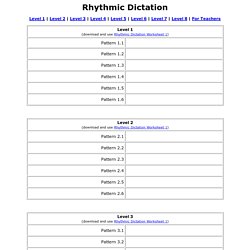
Rhythmic Dictation. Rhythmic Dictation Transcription of rhythmic patters in simple and compound meters with different levels of difficulty.
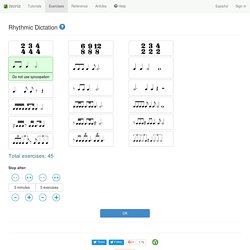
Options The rhythms are grouped in categories of simple measures with quarter note as the unit of time, compound meters with dotted quarter as the unit of time and simple meters with half notes as the unit of time. Select the desired levels (green color indicates selection). You can select all levels of a category by clicking on the upper buttons. Writing notes Click the desired note value. Music Tech Teacher, Musical Instrument Families Reference and Sounds. Curricular Charts - Beth's Notes. 15 Resources for Elementary Music Teachers. The web is an excellent resource for music teachers who need free education materials for the elementary classroom.
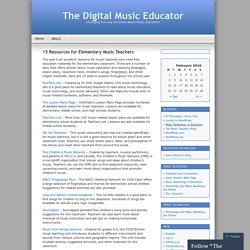
There are a number of sites that offers articles about music education and teaching strategies, lesson plans, classroom tools, children’s songs, fingerplays, and other helpful materials. Here are 15 sites to explore throughout the school year. MusTech.net – Created by Dr. Prof. Elementary School Lesson Plans for Music Subjects. Recognizing Patterns in Music and Children’s Literature Recognizing Patterns in Music and Children’s LiteratureMusic Education Lesson Plan Recognizing Patterns in Music and Children’s Literature Lesson Plan, Level: K-2 Lesson Plan Materials Required:• Whiteboard or chalkboard• Recognizing Patterns in Music and Children’s Literature Lesson Plan Pictures and Worksheet Handout ( … Subjects: Art, Language Arts, Music Grades: Using rhythm instruments with a story!
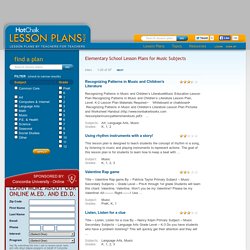
This lesson plan is designed to teach students the concept of rhythm in a song, by listening to music and playing instruments to represent actions. Subject: Music Valentine Rap game Title – Valentine Rap game By – Patricia Taylor Primary Subject – Music Secondary Subjects – Grade Level – Pre-K through 1st grade Students will learn this chant: Valentine, Valentine, Won’t you be my Valentine?
Music Games Online. Ashley-Queens-Elementary-Music-Resources. Elem_music_curriculum_k-5.pdf. Themes & Variations. Learning The Sounds Instruments Part 1, Musical Instruments, Learning For Children. Classical Music for Children. Here are some ideas for using classical music with young children Find more music ideas on the Art & Music Resource Page The Tale of the Tzar Saltan: Flight of the Bumblebee Nikolai Rimsky-Korsakov Pass a beanbag (the “bee”) around the circle of children while the music plays.
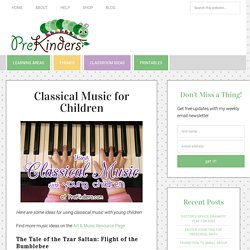
Pause the music occasionally. The person with the beanbag is “stung” and moves to the middle of the circle. Carnival of the Animals Camille Saint-Saens Each song in this series represents the movement of a different animal. Worksheets for Teachers. Recorders the Easy Way - Book 1 - Beth's Notes. Dalcroze Society of America - What is Dalcroze? The Dalcroze approach to music education teaches an understanding of music – its fundamental concepts, its expressive meanings, and its deep connections to other arts and human activities – through ground breaking techniques incorporating rhythmic movement, aural training, and physical, vocal and instrumental improvisation.
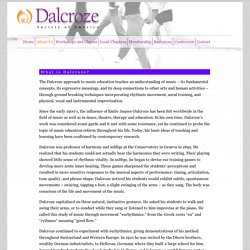
Since the early 1900’s, the influence of Emile Jaques-Dalcroze has been felt worldwide in the field of music as well as in dance, theatre, therapy and education. In his own time, Dalcroze’s work was considered avant-garde and it met with some resistance, yet he continued to probe the topic of music education reform throughout his life. Today, his basic ideas of teaching and learning have been confirmed by contemporary research. Dalcroze was professor of harmony and solfège at the Conservatory in Geneva in 1892. He realized that his students could not actually hear the harmonies they were writing. Dalcroze capitalized on these natural, instinctive gestures. More On Orff Schulwerk - American Orff-Schulwerk Association. AOSA supports and promotes Orff Schulwerk as a model for music and movement education in schools in the United States because it offers a potential for active and creative music making by all children, not just the musically talented.
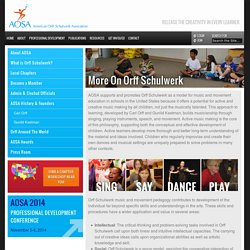
This approach to learning, developed by Carl Orff and Gunild Keetman, builds musicianship through singing, playing instruments, speech, and movement. Active music making is the core of this philosophy, supporting both the conceptual and affective development of children. Active learners develop more thorough and better long-term understanding of the material and ideas involved. Children who regularly improvise and create their own dances and musical settings are uniquely prepared to solve problems in many other contexts. Orff Schulwerk music and movement pedagogy contributes to development of the individual far beyond specific skills and understandings in the arts. Teaching Process Integration Performance. Major Methods of Teaching Music to Kids - Orff, Kodaly, Suzuki and Dalcroze. Numinous: What is Kindergarten Music anyway?: Notes from the Teaching Field. I mentioned in the last Notes from the Teaching Field that I was a high school music director many moons ago and I do plan on writing about some of those adventures later in the year but for now I want to talk about my musical adventures with the kindergarteners.
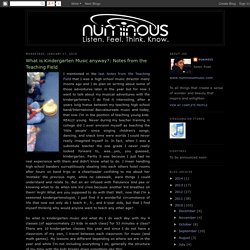
I do find it interesting, after a years long hiatus between my teaching high school band/International Baccalaureate music and today, that now I'm in the position of teaching young kids. REALLY young. Never during my teacher training in college did I ever envision myself as teaching the 'little people' since singing children's songs, dancing, and snack time were worlds I could never really imagined myself in.
In fact, when I was a substitute teacher the one grade I never really looked forward to, was...yes, you guessed, kindergarten. Partly it was because I just had no real experience with them and didn't know what to do. 1. 2. Around January or so, I introduce music notation. 3. 5. What is Kindergarten Music anyway?: Notes from the Teaching Field. Recorders the Easy Way - Book 1 - Beth's Notes. Presto Largo From MusicK8.com.